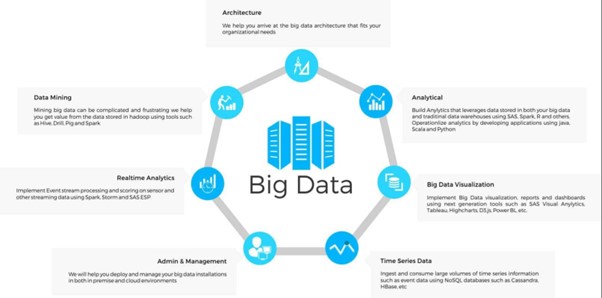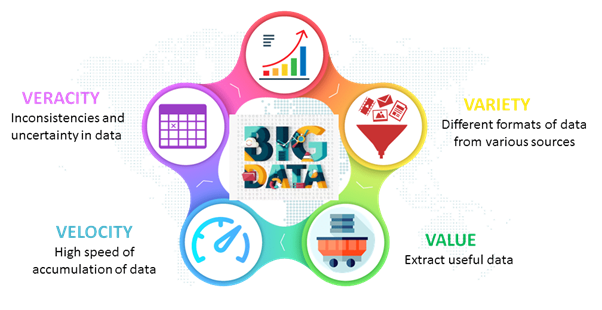
Big data — which is full of potential but needs an expert for proper steering — much caries such waters. The decision of which big data service company to choose is vitally important, serving as your very foundation for a journey that will be data-driven. A blog exists on this subject, helping find out what key factors to take into account when selecting a reliable and capable big data service provider.
Table of Contents
Match Expertise to Your Needs:

Domain Knowledge: Does the company have experience with your industry? Knowing what is different in each market and analyzing data are prevailing conditions for success.
Technical Expertise: Check their team’s qualifications on big data analytics services techniques and programs. Try to find out if they have experience with the very tools or platforms you want to use.
Project Experience: Look into their previous projects and case histories. Try to find project goals and data types similar to yours.
Match the Technology Stack:

Suits: Big data tools and techniques that your company is either currently using or can work together with your preferred platforms in some way.
Growability: Your data requirements are bound to grow. Find a company that offers solutions that can grow with them.
Secure Features: Data security is very important. So, look at the security procedures, and compliance with relevant industry regulations.
Moving on from Just Technology: The Human Touch
Communication and Cooperation: Effective communication is paramount. Examine the company’s style of communication and also their capabilities in terms of how closely they can work with your group.
Project Management: You need a company with a solid record of completing successful projects. That means they specific targeted dates, and there should be a communication process already in place. Industry Recognition: Industry prizes and recognition can suggest a company’s reputation and know-how.
How to Navigate the Market:
Make A Short List of Potential Partners: Find a few companies that look promising, so must be a choice of yours in the end. Look for recommendations from those who have already used them or visit websites where people (in your capacity) give feedback on different experiences with various businesses.
Create an RFP: This will tell us your business objectives, data types, length and cost. Caps and run costs are examples of other items outside of our general structure that you might want reflected in the proposals from each company seeking this huge business prize.
Evaluate Proposals and Do Interviews: See if any points reveal more about how they approach projects, their actual methods, budgeting, etc. Interviews are helpful too, though we should be looking for personality, attitude and good communication abilities just as much here.
The Final Decision:
Cost or quality: Quality is always better than things being done at the expense. Even though it may not be the cheapest option available, consider what like-minded businesses will give you by way of a return on investment. (These ideas are provided for your future reference)
Cultural Fit: Do they think and act as you do? This harmonizes well with teamwork.
A Partnership for Success
Choosing the right big data maven is an investment in your company’s future. By analysing end-to-end these points, having an in-depth review, and prochoice both of specialization and cultural convergence, you can find a partner to unlock the true potential of big data with everyone on board. Remember-small companies grow together with their customers over time as they evolve together and this is a shared success story. You should always be looking for people who share your company’s aspirations and philosophy, rather than merely acting as a source of information or a mouthpiece for you.
Doing Your Homework: Advanced Considerations in Selecting a Big Data Services Company
The last section presented certain factors to be considered thoroughly when choosing big data services companies. Here we delve into advanced issues:
Understanding the Stage of Your Data Development:
Data Strategy: Does the company help develop a comprehensive data strategy that reflects your business objectives? Which details can be expected there: how long does data collection go on storage? Whether or not it has obtained licensing or rights for its content?
Data Governance: Is the approach it takes to data governance acceptable? Better companies will focus on making sure data is both correct and consistent, that information is safe (both on your behalf and the wider public front) and provide compliance with international standards where relevant.
Change management: such a move is of great impact on the organizational structure and work routines. We will share their experiences in the use of Change Management strategies so that you can suffer less when you introduce these changes to your organization.
Making Your Partnership Safe in The Future:
Innovation and The New Trend: Does the company always pursue the fashion and keep up with cutting-edge big data technologies AI, machine learning, or IoT integration?
Scalability and Flexibility: Can the company adapt to changing data volumes as well as new needs of the enterprise? Look for vendors offering flexible solutions that scale with your company’s growth.
Vendor Lock-in: Don’t get tied down by proprietary technology. Choose a company that is open source. You cannot go wrong if the vendor provides migration paths as needed.
Laying a Solid Foundation for Cooperation:
Data Ownership and Transparency: Clearly define the rights of ownership for data and access controls. You should demand that the company emphasize transparency in data and report regular insights on usage of their data.
Reporting and Visualization: Examine their data visualization tools and reporting capabilities. Partner with a company that can translate complex data into clear and actionable information for a range of audiences.
Post-Implementation Support: Big Data is a journey, not a destination. Choose a partner equipped to provide long-term support, maintenance and training to ensure. successful long-term deployments
Negotiating the Right Terms:
Pricing Structure: There are numerous pricing models, for example fixed fees, pay-as-you-go in addition tiered pricing. Do not oversee this. Choose the ones that will best outfit the scope in addition budget of your project
Service Level Agreements (SLAs): Set out in plain language SLAs that establish performance metrics, responsiveness time for support calls as well as security guarantees at both the individual and enterprise levels.
Intellectual Property (IP) Rights: Clearly define ownership of any data analysis models or intellectual property produced during the project.
How To Make an Informed Decision
It is a great decision to choose a big data business. Take account of the factors introduced above, as well as considering the advanced considerations so that you enter into your selection process well-informed both with regard economic background and otherwise. Remember, the ideal partner needs to be more than just a provider of technology; it is a strategic collaborator who invests in your data-driven success. Through careful evaluation and an eye to long-term partnership potential, read: How to cultivate a successful big data partnership The Human Element Huge data partnership can never succeed without both technology and personal input. Here’s how to foster a collaboration and equitable relationship with your chosen major data service company:
Building Trust and Transparency:
Keep Open Communication: Maintain open communications throughout the project. Share regular updates and anxieties straightaway, so as to avoid misunderstandings that can breed animosity between both sides.
Shared Goals and Objectives: Clearly define your goals and objectives at the same as those of the big data services company. Make sure that everyone aligns their efforts on these common ends for a single vision.
Transparency in Data Utilization: Be clear on how your data will be applied and analysed and screened. Find a partner that keeps privacy leading the way and works in line with moral data practices.
Fostering Collaboration and Teamwork:
Joint Workshops and Training: Arrange joint workshops and training sessions to bridge the knowledge gap. This creates collaboration, deepens mutual appreciation of another’s expertise, and builds trust.
Dedicated Teams and Points of Contact: From each side, put out dedicated teams to secure clear communication and responsibility. Make it obvious who does what in each team so that you can save time in general communications or solving problems.
Embracing Different Perspectives, it is important to recognize the value of different perspectives. Encourage your team’s business knowledge and the big data company’s technical capabilities to cooperate. In this way, innovative thinking can be unlocked from both sides of finding solutions.
Take Managing Expectations and Defining Success for Example: Clear Group Guidelines: Situational bargained time limits and achievable test points. This ensures both sides of the enterprise will understand their position and prospects.
Defining Success Metrics: What are your standards of success? Quantifiable metrics agreed with your business goals. This will include improved customer satisfaction, increased efficiency of operations or cost reduction.
Regular Reviews and Feedback: Organize regular project reviews to compare notes on progress, meet challenges and provide constructive feedbacks. Reward an environment of continuous improvement and open communication.
Build a Long-Term Partnership Invest in Relationships: View this as more than a one-time project. Invest in building a long-term relationship with the big data services company. This encourages trust, simplifies future collaborations, and allows for continued education and improvement. Adaptability and Change Management: Big data initiatives are dynamic things. Work with your partners to devise a flexible plan which could evolve as business needs change, new data comes online and technology matures.
Investing in Learning: Big data technology is in constant flux. Encourage both sides of the partnership to engage in ongoing learning and training. This will keep you up-to-date with new developments and best practices.
A Symphony of Expertise and Collaboration Al Shamus:
A successful big data partnership is about more than just the technology itself. It is a symphony of different skills, cooperation and a common vision for data-driven success. By emphasising open communication, calling for trust, creating a obliging atmosphere and clearly delineating expectations, you can produce a long-lasting partnership which will authorise you to harness the full value of your data in addition transform your business in this new age of big data processing.
Big Data Demystified: 10 Common Questions Answered
Big data could very fine be described as a power of nature, but it doesn’t have to be. Here are 10 questions you always wanted to ask and their replies to give some clear insight into this ever-expanding field:
What Is Big Data?
Large and complex data sets that are impossible to handle with traditional data processing tools. It is characterized by volume (large-scale data), variety (all kinds of text, image and video), velocity (rapidly generated high-frequency data) and, occasionally, veracity (the quality and reliability of the data).
Where Does Big Data Come From? Big data comes from everywhere! In this world, content can be anything – it might be a social media post, sensor data from machines used for manufacturing, customer transactions, web site traffic and scientific research results.
Why Is Big Data Important? Big data helps businesses make sense of their data. Greater insights in turn lead to better decisions and customer experience, product innovation, as well as increased efficiency all around.
What Are Big Data Services? Big data services provide software and tools to manage, analyse and visualize it. Services such as storage of data, processing it and providing analytical tools for examining that information on screen – or in printout form if needed.
What Are Some Examples of Big Data in Action? Big data is widely used across many industries. Retailers use big data to personalize suggestions for customers, healthcare organizations use it in the early diagnosis of disease and logistics companies get better results from deliveries by using employees as points of intelligence out their end route.
Is Big Data Secure? Security is a major concern with big data. Big data services offer security features like encryption and access control to protect sensitive information.
What Are the Challenges of Big Data? Challenges include data quality, privacy, cost and complexity managing big data or getting it into useful formats for different systems.
What Skills Are Needed for Big Data? Demand is strong for data scientists, data analysts, business intelligence professionals with good data analysis capacity and programming abilities.
Is big data suitable for my business? If your business makes large amounts of data and wants to extract information from it, at that time big data is probably for you.
How to start with big data? First, determine the goals of your business and the kind of insight you want to get out of it. Next, investigate the range of big data services available and consider your budget and technical standing.


![How to fix [pii_email_7aa1063d0d4a455b59e4] Error](https://bloggingrevolution.com/wp-content/uploads/2021/07/pii_email_7aa1063d0d4a455b59e4-300x169.jpg)

![How to Fix [pii_email_123dd92c65546aac4234] Error](https://bloggingrevolution.com/wp-content/uploads/2021/07/pii_email_123dd92c65546aac4234-300x169.png)